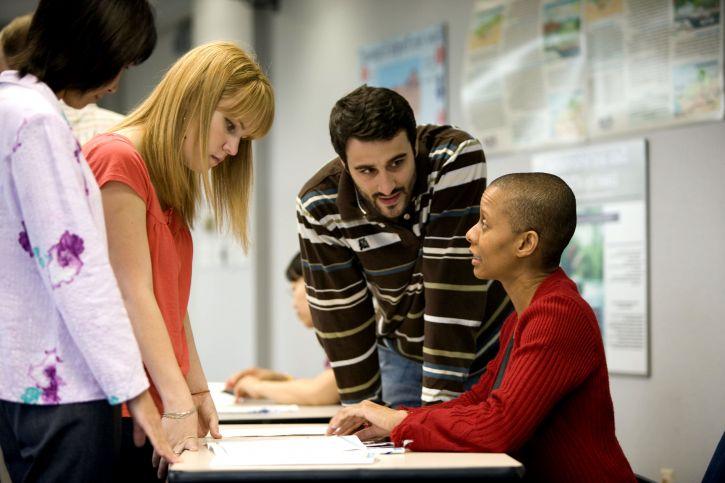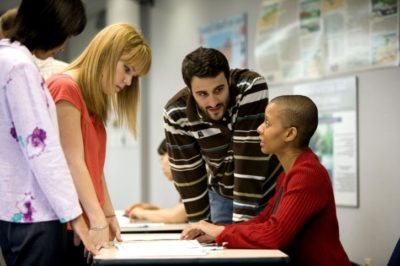- August 10, 2022
- Posted by: David Marshall
- Category: Leadership, Management, Productivity

Last week, I wrote about how remote work is ruining water cooler conversations and making it harder for people to have those simple conversations that lead to great innovations.
I said:
Or they have a company culture where it’s acceptable to pop in on a colleague at their cubicle or desk. In open-concept offices, people think nothing of rolling their chair to their neighbor’s desk for a quick chat.
. . .
The important thing that happens during these conversations is the exchange of ideas: The spur-of-the-moment idea that gets expressed. The quick question to the knowledgeable person who shares a larger lesson. The deepening of work friendships that end up keeping people from job-hopping every two or three years.
This week, I wanted to talk about how remote work is stifling people’s opportunities for professional growth and development, and the loss of the mentor-mentee relationship.
One thing that often happens in a workplace is that younger, newer associates often look to older, veteran associates for guidance and advice. They learn the tiny bits of institutional knowledge that you just don’t pick up in a manual or from a job description.
 Small things like not scheduling meetings at 8:00 a.m. on a Monday or 4:00 p.m. on a Friday; how to refill the coffee machine; the shortcut to duplicate records on the CRM; how to navigate around the corporate purchasing software.
Small things like not scheduling meetings at 8:00 a.m. on a Monday or 4:00 p.m. on a Friday; how to refill the coffee machine; the shortcut to duplicate records on the CRM; how to navigate around the corporate purchasing software.
Similarly, younger workers often look to their older workers and managers for actual career mentors. The people who provide the kind of guidance to help that person reach the next level in their career.
A mentor-mentee relationship can be informal, where the mentee just pays close attention to the mentor, asking the occasional question, but learning how to work as the mentor models best practices and smart decisions.
Or it could be something formal, where the mentor agrees to work with the mentee. They meet regularly, discuss important issues, and talk about ideas and decisions. The mentor may assign readings or make strategic introductions. The mentee gets a chance to learn from someone who has been in their shoes and they can absorb all this great advice and knowledge.
How can we do that in a remote work setting? You just can’t capture the intimacy and subtle nuances of a relationship on a Zoom call. These are relationships that develop best face-to-face, across a desk or a coffee shop table.
Don’t get me wrong. It’s possible to have a mentor-mentee relationship that’s virtual, but it takes a lot more planning and work, and you miss out on those spontaneous conversations and random bits of wisdom that get shared during a casual conversation.
We’re Missing Training and Development Opportunities, Too
Another important facet of professional development includes seminars, conferences, and trade shows we all attended before the pandemic. There were plenty of opportunities to meet new people, meeting them on the show floor or between sessions. We’re missing those opportunities as well.
While it’s possible to attend a virtual conference on Zoom, have you ever known the excitement of meeting someone at a conference or trade show, and you hit it off so well, you say, “Hey, let’s skip this next session and get lunch or get a drink?” We’re missing out on those opportunities as well. Being able to network at these different public events has been critical to our networking efforts and meeting key people who can help us close the next deal or have a major impact on our careers.
Communication isn’t impossible in this age of Zoom, it’s just lacking. We already know that as much as 70% – 93% of all communication is nonverbal. That not only includes a person’s tone of voice, volume, and inflection, it also means posture, body language, eye contact, gestures, and so on. Most of that is lost because our bodies are usually out of camera view on the calls, meaning you’re missing the important meaning behind a lot of the words you’re hearing.
Remote work may seem easier and more convenient, but we’re losing out on so much more, the downsides outweigh the benefits.
I’ve been a manufacturing executive, as well as a sales and marketing professional, for a few decades. Now I help companies turn around their own business, including pivoting within their industry. If you would like more information, please visit my website and connect with me on Twitter, Facebook, or LinkedIn.
Photo credit: Cade Martin, Dawn Arlotta, USCDCP (Pixnio, Creative Commons 0)

